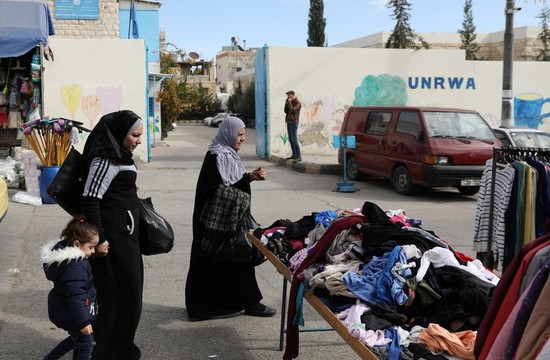This is an arduous task since there are currently 1.3 million Syrians and 300,000 Iraqis in the country.
Refugee camp in north-east Amman in November 2018. (Photo by Andre Pain/EPA)
As they pray the Our Father in Aramaic, the language spoken by Jesus, time stops in the courtyard of the little school at Marka in the suburbs of Amman, the Jordanian capital.
Nearly 200 pupils aged from seven to 14 come to the school, which is attached to the city’s Catholic parish, to follow courses in English, Arabic, mathematics and catechism each afternoon.
During the morning, the buildings are used by Jordanian schoolchildren. From midday, however, the school is reserved for the children of Iraqi refugees from the Chaldean community, many of whom arrived in Jordan years ago after fleeing the bloody wars of the region.
Integration courses
“Thanks to Father Khalil Jaar, we have been able to organize eight classes and enable dozens of children to follow or restart integration classes,” smiles Afnan Andraws, the school director, who is Iraqi herself.
The children follow three hours of lessons before taking a break.
“Some keep part of their snack to share with their families,” notes one regular visitor to the venue.
The school’s work is far from an isolated instance in Jordan, considered an isle of peace in a conflict-stricken region. Christians of all denominations and parishes, comprise only 4 percent of the nation’s 9.7 million people among a majority Sunni population, are extremely proactive working with the refugee community.
This is an arduous task since there are currently 1.3 million Syrians and 300,000 Iraqis on Jordanian soil in a society that still has a deeply-rooted tradition of welcoming foreigners.
“We are proud to say that 85 percent of them are already integrated into local communities and no longer stuck in camps, even though there are still several large camps on Jordanian territory,” said Wael Suleiman, the director of Caritas Jordan.
Restaurant of Mercy
Along with the Jerusalem Latin Patriarchate and the Vicariate of the Kingdom, the group genuinely wishes to serve uprooted communities.
In the months that followed Pope Francis’ visit in 2014, it helped launch a Restaurant of Mercy in Amman.
Each evening, many Iraqi and Syrian families come to dine at the restaurant, which operates as a kind of popular canteen that is entirely free.
Originally from Homs, Asma and Farok, aged 35 and 43 respectively, slowly pick at their chicken legs under the greedy eyes of their youngest son.
“We would be really badly off if we had to do without the assistance of these Christian organizations,” say the members of this Muslim family, who were forced to flee ISIS in 2011. “We have not been able to obtain work permits here in Jordan.”
Like the immense majority of refugees in Jordan, the Syrian couple dream — even more than obtaining a job — of continuing their exodus towards Canada, Europe or Australia.
But Wael Suleiman completely rejects this attitude.
“When Pope Francis requested all parishes, particularly in the west, to open their doors to welcome refugee families, we wrote to him to ask him to withdraw his appeal,” Suleiman recalls.
“Instead, we want to encourage Europe to help us rebuild peace in the places were the refugees are!” he insists.
By: Malo Tresca
Source: la-croix.com






